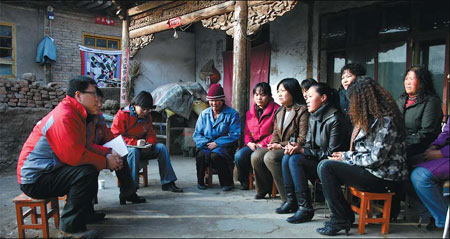'Spring' in the air for NGOs?
Updated: 2013-04-17 07:47
By Tang Yue and He Dan in Beijing (China Daily)
|
|||||||||||
No green light for all
While the four categories of NGO are being given the green light to direct registration, the existing system will still apply to organizations involved in politics, the law and religion. Chinese branches of overseas NGOs will also still be subject to the existing regulations, said Vice-Premier Ma Kai during the NPC session.
"It is understandable that they take reform step by step, given the situation in China today," said Wang Ming. "But I hope the definitions will be made clearer when the detailed regulations are published so NGOs will face fewer intangible barriers when they apply for registration."
 |
|
Staff from Beijing Zhongze Women's Legal Counseling and Service Center talk with rural women in Qinghai in 2009. Provided to China Daily |
Wang Jianjun, director-general of the Bureau of Administration of NGOs under the Ministry of Civil Affairs, said the authorities are still working on the definitions.
The exclusion of organizations related to the legal system came as no surprise to Lu Xiaoquan, deputy director of Beijing Zhongze Women's Legal Counseling and Service Center.
"Of course, I'm glad to see the other four types of NGO have their 'spring' in sight now. For us, the situation remains unchanged. It might still be a sensitive area from the perspective of the government," said Lu.
Established at Peking University in 1995, Lu's center was the first civil organization to provide legal assistance to women in China. The founder, Guo Jianmei, was given the Women of Courage Award by the United States' State Department, presented by Michelle Obama and the then secretary of state, Hilary Clinton, whom Guo has met seven times.
The center became independent in 2010, but its failure to secure NGO status meant it was forced to register as a business. Last year, it received donations totaling roughly 2 million yuan, mainly from overseas foundations. However, its status means it paid tax at a rate of 14 percent. In contrast, the rate for NGOs is 5.5 percent.
"I'm looking forward to the implementation of the new policy, but we will only feel really hopeful if it is fully carried out," he said.
"But there is also a possibility that the government will ease the regulations on those four specified types of NGO, while imposing even stricter ones on us. We'll just have to wait and see how things pan out."
Related Stories
New rules for NGOs to improve operations 2013-04-17 00:22
Labor NGOs call for more finance, planning 2013-03-21 14:40
Civil societies get government boost 2013-03-14 07:09
Chinese government's NGO funding peaks in 2012 2013-02-13 00:01
Today's Top News
Police continue manhunt for 2nd bombing suspect
H7N9 flu transmission studied
8% growth predicted for Q2
Nuke reactor gets foreign contract
First couple on Time's list of most influential
'Green' awareness levels drop in Beijing
Palace Museum spruces up
Trading channels 'need to broaden'
Hot Topics
Lunar probe , China growth forecasts, Emission rules get tougher, China seen through 'colored lens', International board,
Editor's Picks

|

|

|

|

|

|





